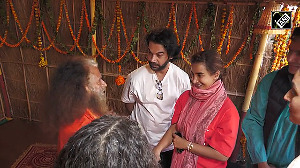The Dalai Lama on Sunday accused China of unleashing a 'cultural genocide' in Tibet and demanded an impartial international probe into the situation in violence-hit Lhasa.
Addressing his first press conference in Mcleodganj, Himachal Pradesh, in the wake of the violence in the Tibetan capital since Friday, the exiled Tibetan spiritual leader felt said that India has a few limitations as far as China is concerned and was 'too cautious' on the Tibet issue.
The Indian government, the 73-year-old monk said, had 'hostile views' on certain actions of Tibetans but 'we should not pick up one particular incident'. He did not elaborate.
The Dalai Lama, a Nobel Peace laureate, demanded an international probe into the Chinese crackdown against protesters in Lhasa, saying "some respected international organisations can find out what the situation is in Tibet and what caused it".
Replying to questions, he said, 'Tibetans' protests in Lhasa is borne out of China carrying out a sort of cultural genocide in Tibet intentionally or unintentionally'.
On whether he could contain the violence, which, according to Chinese authorities, had claimed at 10 lives, he said: "I have no such power. I do feel helpless."
Expressing concern over China serving an ultimatum to protestors to surrender by Monday midnight, he said, "While the Chinese authorities are bent upon crushing the agitation with the help of the army, Tibetans in Lhasa and other places are equally determined to continue the agitation."
Denying China's charge that he was behind the violence, the worst since 1989, the Dalai Lama said that he was 'completely committed' to non-violence and favoured a 'middle path' which he said was also supported by some Chinese officials and scholars, whom he did not name.
On whether he would use his good office to ask his fellow countrymen to halt the protests, he said 'the situation in Tibet has become volatile and only a miracle power can control it, not me'.
The Dalai Lama, who offered prayers before talking to the press, said 'we want genuine autonomy and not independence (from China)'.
Maintaining that he was being made a 'scapegoat' by the Chinese authorities, the Dalai Lama said whether Beijing admitted or not, there was a problem in Tibet.
He said, "There is an ancient cultural heritage that is facing serious danger. China is imposing political education in monasteries there, much to the dislike of the monks."
"They (China) simply rely on using force in order to simulate peace, a peace brought by force using a rule of terror," he added.
The Dalai Lama said he has been receiving phone calls and e-mails from Tibetans asking him not to stop them from continuing with their agitation in Lhasa.
He blamed the local Chinese authorities in Tibet were responsible for the 'non-solution' of the problem.
"While educated Chinese very well understand our viewpoint that the only solution to the Tibet issue is by granting genuine autonomy, the local Chinese authorities nourish a negative attitude," he said.
The spiritual leader said he was of the opinion that 'genuine harmony and unity between the Tibetans and the Chinese can be established only on the basis of trust and this shall come from the heart'.
Recalling the direct talks between his envoys and the Chinese government, which began in 2002, the Dalai Lama said the negotiations have been facing 'difficulties' since February 2006 with Beijing 'hardening' its stand on the Tibet issue.






 © 2025
© 2025